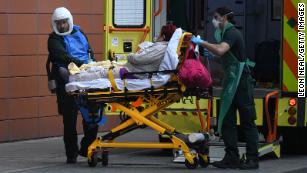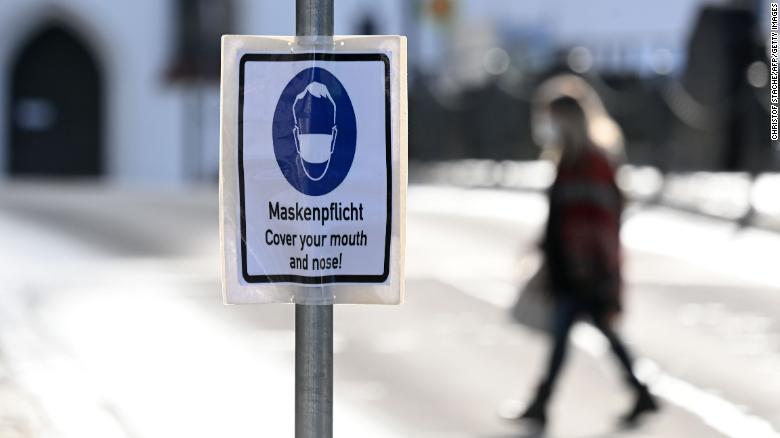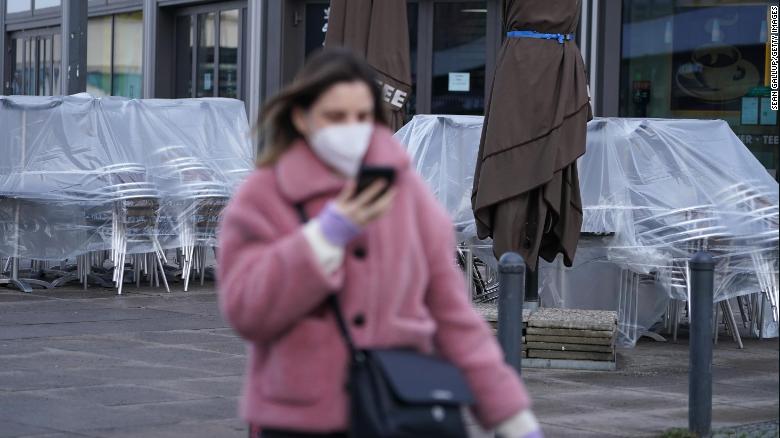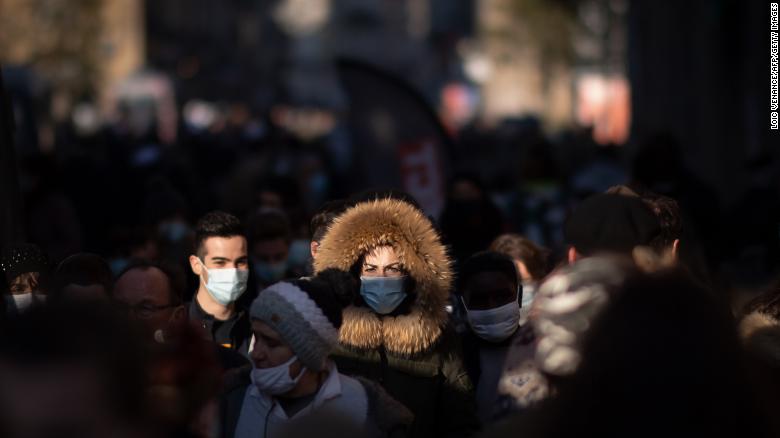European countries mandate medical-grade masks over homemade cloth face coverings

Confronting new, more transmissible variants of the coronavirus and a winter spike in infections, a number of European countries are beginning to make medical-grade face masks mandatory in the hope that they can slow the spread of the disease.
The French government has now mandated that citizens wear single-use surgical FFP1 masks, more protective FFP2 filtering facepiece respirators or fabric masks which meet the same "Category 1" specifications -- blocking more than 90% of particles -- in all public places. In layman's terms, homemade masks will no longer cut it.
It follows a decision by the German government on Tuesday requiring all people to wear either FFP1 or FFP2 masks while on public transport, in workplaces and in shops. The move came after the German state of Bavaria introduced an even more stringent measure: Enforcing surgical grade N95 respirators, which filter 95% of air particles, in stores and on public transport.
Austria will introduce its own FFP2 mandate on public transport and in shops from January 25.
German Chancellor Angela Merkel cited the spread of new coronavirus variants, which were first detected in the United Kingdom, South Africa and Brazil, as the reason for stricter requirements. "I urge people to take this seriously. Otherwise it is difficult to prevent a third wave," Merkel told journalists in Berlin on Thursday, adding that a video summit of European Union leaders would be focused squarely on ways to counter the spread of variants on the continent.
During the Thursday summit, EU leaders weighed tougher border restrictions to limit non-essential travel and agreed to a common framework for rapid testing, but mask-wearing was not discussed.
The European Center for Disease Control and Prevention (ECDC) warned Thursday that new variants of the coronavirus could cause more hospitalizations and deaths across Europe, urging countries to start taking extra measures -- from physical distancing, to quarantining and contact tracing -- immediately. The ECDC currently recommends face masks in indoor and outdoor situations when physical distancing cannot be guaranteed, but does not specify what type of face covering should be used.

London's ICU nurses detail 'diluted' care, depression and disaster during the UK's deadly second wave
Meanwhile, in Britain, where a highly-contagious coronavirus mutation is driving a deadly third wave of the virus, medical-grade masks have not been mandated in public. Instead, face coverings are required on public transport, in shops and in other indoor settings where social distancing may be difficult.
In the UK government's Covid guidance, scarves and bandanas are considered to be appropriate face coverings, despite evidence they do not effectively block respiratory droplets emitted by the wearer.
Faced with more transmissible variants, some scientists say that the focus should be on limiting the amount of viral aerosol exposure as much as possible -- and recent studies suggest the best way to do that is through medical-grade masks, in addition to other public health measures.
Unlike fabric and surgical masks, which protect other people from larger respiratory droplets emitted when speaking, coughing or sneezing -- in other words, outflowing air -- FFP masks protect the wearer by filtering both the outflow and inflow of air. They can also provide some level of protection against smaller droplets, or aerosols. When fitted correctly, FFP2 masks can filter at least 94% of particles.

A sign mandating mask-wearing in the city of Fuerstenfeldbruck, southern Germany.

A woman wearing an FFP2 face mask walks past a shuttered cafe in Berlin, Germany.
And while the tight weave of surgical masks offer a high level of outflowing protection -- which is why they're used by medical professionals around patients -- cloth masks are more hit or miss. Their efficacy depends on the number of layers of fabric and the type of fabric used -- most don't have any sort of safety rating.
Guidance on cloth masks, issued during the first wave of the pandemic when less was known about how Covid-19 could spread through aerosols and supplies of medical-grade masks were precarious, are now being reassessed.
The new recommendations in Europe come after supplies of medical masks have increased, following initial fears there wouldn't be enough for frontline workers. But there are still questions over supply chain disruptions.
Cloth masks are still considered to be better than wearing no mask at all, but France's health advisory council on Monday argued they may not offer sufficient protection against new variants.
"We are not questioning the masks used up to now ... but as we don't have any new weapons against the new strains, the only thing we can do is to improve the weapons we already have," Daniel Camus, a member of the council, told France's public broadcaster.
There is some scientific evidence that medical-grade masks offer more protection and can help prevent the spread of the virus.

People wearing face masks in Rennes, western France.
A study published in the Lancet medical journal in June comparing transmission rates across 16 countries found that N95s and other respirator-type masks might give greater protection from viral transmission than surgical or multi-layered cotton masks.
And another study released in August by Duke University, which compared the efficacy of 14 commonly available face coverings, found that the most effective was the fitted N95, followed by three-layer surgical masks. Neck fleeces, folded bandanas and knitted masks did not offer much protection, and in the case of the neck fleeces, also called gaiter masks, actually increased the transmission of respiratory droplets.
Still, current guidance from the World Health Organization (WHO) states that medical or surgical masks should only be worn by healthcare workers, people with Covid-19 symptoms, those coming into contact with them, anyone aged 60 or over, as well as people with underlying medical conditions.
The WHO recommends that the general population use fabric masks, ideally with three layers.
But for European politicians scrambling to prevent a fresh surge of coronavirus cases from spiraling, the calculation is simple: If medical-grade masks will help stymie the spread of the virus, they should be enforced.
"We also want to make everyday life safer," Bavarian Prime Minister Markus Söder said last week, announcing the new mask rule.
https://digg.com/@gast-123
https://digg.com/@galih-ginanjar
https://digg.com/@agus-kuncoro
https://paiza.io/projects/XM2FQD7ghPdzrL-fwo8qHA?language=php
https://www.peeranswer.com/question/600d5ab4af6784a1614804b1

The Secrets to Pass Cisco 300-615 Certification Exams With Ease
- Cyber security is a means to protect the automated and interconnected system from any unauthenticated access. Some father and mom

Overhead garage door repair
- IF WE CAN'T FIX IT, NO ONE CAN! We are providing Electric gate repair, emergency gate repair and installation in Los Angeles, California. Ph: 4245121212

Tips For Passing Oracle 1Z0-997-20 Certification Exam
- Preferably, you go by means of highschool, graduate, after which go on for getting a marvelous existence. In case you are a person of the
